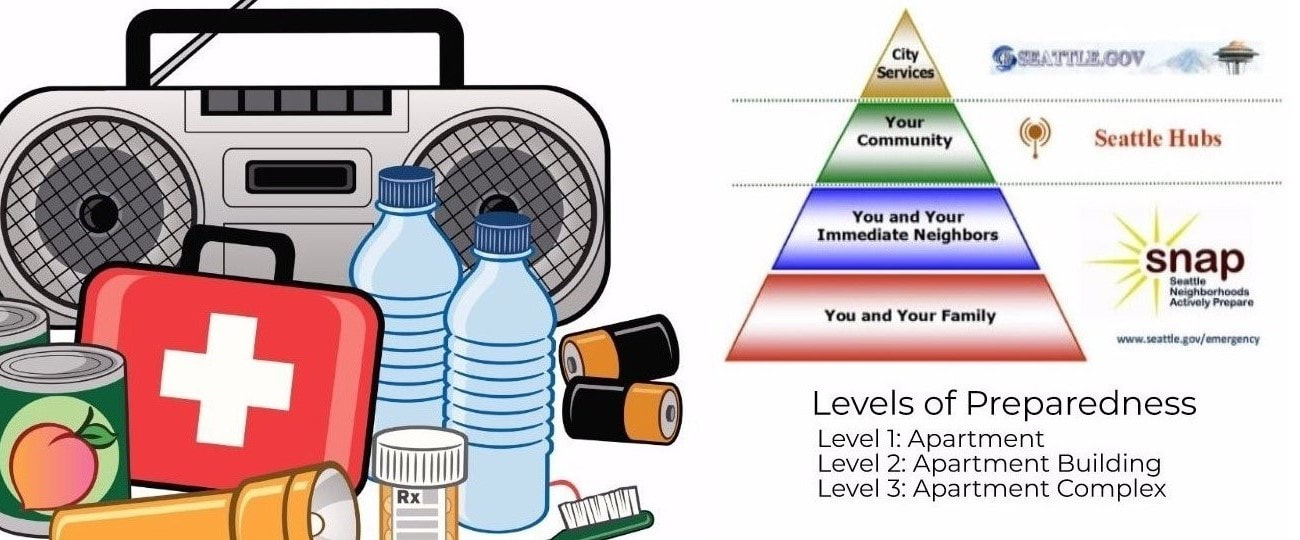Introduction
Disaster Planning Phases:
- Disaster Preparedness > on going - education, evacuation plans, and stocking at least 2 weeks of survival materials.
- Disaster Survival > minutes to days - surviving the immediate threats of injury or death.
- Disaster Response > days to weeks - evacuation or sheltering in place, communication, and helping neighbors.
- Disaster Recovery > weeks to months - returning to pre-disaster conditions or moving away.
In the event of a major earthquake, Arrowhead Gardens might be isolated for several days or weeks. Bridges could be down. Utilities could be disrupted. Communications by phone could be cut off or limited. Roads could be blocked by debris and landslides. Emergency first responders would be directed to locations that had the greatest need for assistance. Some Seattle locations might be unreachable by vehicles for several days.
The most recent significant earthquake in Washington was the 2001 Nasqaully Earthquake. Here is a Wikipedia List of Earthquakes in Washington.
Disaster Planning could be vital for survivability of residents living at Arrowhead Gardens Apartments. There are over 500 residents living here, making Arrowhead the equivalent of a community neighborhood and Level 3 in the Preparedness Pyramid.
A Disaster Planning Group (DPG) was created in November 2023. Participants are Kathy R A-Bldg, Frances B C-Bldg, and John W D-Bldg. At the first meeting on November 10, 2023, the DPG agreed to focus on earthquakes as the first major topic. DPG will present an educational topic every 1 to 2 months for the residents, either as newsletters, presentations, webinars, workshops or documents.
The most recent significant earthquake in Washington was the 2001 Nasqaully Earthquake. Here is a Wikipedia List of Earthquakes in Washington.
Disaster Planning could be vital for survivability of residents living at Arrowhead Gardens Apartments. There are over 500 residents living here, making Arrowhead the equivalent of a community neighborhood and Level 3 in the Preparedness Pyramid.
A Disaster Planning Group (DPG) was created in November 2023. Participants are Kathy R A-Bldg, Frances B C-Bldg, and John W D-Bldg. At the first meeting on November 10, 2023, the DPG agreed to focus on earthquakes as the first major topic. DPG will present an educational topic every 1 to 2 months for the residents, either as newsletters, presentations, webinars, workshops or documents.

A wiki with resources for disaster planning can be viewed at https://amber-mellisent-44.tiiny.site/ or downloaded from Google Drive at https://tinyurl.com/agrc-disaster-plan along with other planning documents.
2024: Topics to be presented by Disaster Planning Group.
(Emergency Planning and Disaster Planning overlap. Disaster Planning is needed when outside assistance is not available for days or weeks.)
(Emergency Planning and Disaster Planning overlap. Disaster Planning is needed when outside assistance is not available for days or weeks.)
- Earthquakes & Other Hazards: Risks & immediate survival.
- Communication: Alerts & use of electronics.
- Disaster Planning Resources: Online & offline.
- Check Lists: Adding and storing survival items over time.
- Water: Purchase, storage, filtering & disinfection.
- Food: Purchase, storage, preparation, & off-grid cooking.
- Medicines: Store and rotate extra supplies.
- Power Outage: Food prep. Backup power. Emergency lights.
- Personal Hygiene: Keeping clean and fresh.
- Sanitation: Poo & pee collection; avoiding spread of diseases.
- Personal Documents: Safeguard originals; Make paper & digital copies.
- Pets: Food, water, medicine, carriers, toys, papers, etc.
- First Aid: Kits & training.
- Bug Out Bags: When it's not safe to shelter in place.
- Neighbors: Helping neighbors.
- Community: How residents can organize to offer mutual assistance.

 RSS Feed
RSS Feed